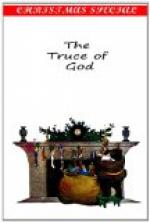But no sooner had Roland pronounced those last words, than the Bishop of Porto leaped from his chair, and cried out: “Seize him!” The prefect and nobles of Rome and the soldiers drew their swords, and, in their sudden fury, would have killed the audacious envoy, had not Gregory, repeating his magnanimity to Cencius, covered the clerk with his own body, and by his calmness and eloquence controlled the indignation and disgust of his too zealous friends.
“My friends!” he said, with all the dignity of human greatness, elevated and purified by the most exalted piety, “disturb not the peace of the Church. Behold the dangerous times, of which the Scripture speaks, are come, when men shall be lovers of themselves, covetous, haughty, and disobedient to parents. We cannot escape these scandals; and God has said that He has sent us like sheep in the midst of wolves. It is necessary for us then to combine the innocence of the dove with the prudence of the serpent. Now, when the precursor of Antichrist erects himself against the Church, he must find us innocent and prudent; these dispositions constitute wisdom. We must hate no one, but bear with the madmen who would violate the law of God. Remember that God, descending a second time among men, proclaims aloud: ’He who would follow me must forsake himself!’ We have lived in peace long enough, and God wishes that the harvest should again be moistened with the blood of His Saints. Let us prepare for martyrdom, if it shall be needed, for the law of God, and resolve that nothing shall sever us from the charity of Jesus Christ.”
The synod, in breathless interest, listened to the holy Pontiff, who then proceeded with wonderful composure to read the charges that had been preferred against him. Among Roland’s letters was another signed, “Henry, king not by usurpation, but by the grace of God, to Hildebrand, false monk and anti-pope.” This was couched, if possible, in language more insulting than the former. One sentence will show the temper of the document, and prove that the king was struggling to build up a monarchy of divine rights and appointment. “A true Pope, Saint Leo, says, Fear God! honor the king! But as you do not fear God, neither do you honor me whom He has appointed king.” Can any expression more clearly indicate that Henry of Austria had resolved to crush a Pontiff who stood between him and unquestioned despotism, and that he aimed at a heaven-commissioned temporal power, often conceded, it is true, but never by Catholicity. The letter concludes with these words: “I, Henry, king by the grace of God, warn you, with all our bishops: descend! descend!”




